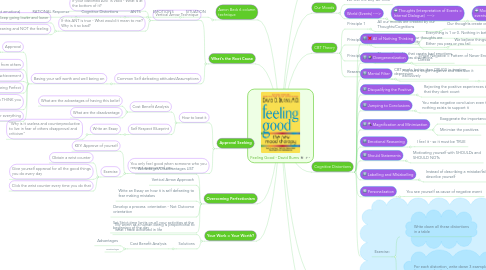
1. Aaron Beck 6 column technique
1.1. SITUATION
1.1.1. EMOTIONS
1.1.1.1. ANTS
1.1.1.1.1. Cognitive Distortions
2. What's the Root Cause
2.1. Vertical Arrow Technique
2.1.1. If your distorted ANT is valid - What is at the bottom of it?
2.1.2. If this ANT is true - What would it mean to me? Why is it so bad?
2.1.2.1. Keep going lower and lower
2.1.2.1.1. To the basic self defeating attitude
2.1.2.2. Pursue the meaning and NOT the feeling
2.2. Common Self defeating attitudes/Assumptions
2.2.1. Basing your self worth and well being on
2.2.1.1. Approval
2.2.1.1.1. We feel great when we get their approval.
2.2.1.1.2. But horrible when we dont
2.2.1.2. Love from others
2.2.1.3. Achievement
2.2.1.4. being Perfect
2.2.1.5. Having what you THINK you are entitled to
2.2.1.6. Being completely responsible for everything
3. Approval Seeking
3.1. How to beat it
3.1.1. Cost Benefit Analysis
3.1.1.1. What are the advantages of having this belief
3.1.1.2. What are the disadvantage
3.1.2. Self Respect Blueprint
3.1.2.1. Write an Essay
3.1.2.1.1. "Why is it useless and counterproductive to live in fear of others disapproval and criticism"
3.2. You only feel good when someone who you respect approves of you
3.2.1. KEY: Approve of yourself
3.2.2. Exercise
3.2.2.1. Obtain a wrist counter
3.2.2.2. Give yourself approval for all the good things you do every day
3.2.2.3. Click the wrist counter every time you do that
4. Your Work = Your Worth?
4.1. My worth as a human being is proportional to what I have achieved in life
4.2. Solutions
4.2.1. Cost Benefit Analysis
4.2.1.1. Advantages
4.2.1.2. Disadvantages
5. Overcoming Perfectionism
5.1. Advantages/Disadvantages LIST
5.2. Vertical Arrow Approach
5.3. Write an Essay on how it is self defeating to fear making mistakes
5.4. Develop a process orientation - Not Outcome orientation
5.5. Set Strict time limits on all your activities at the beginning of the day
6. Basics
6.1. Message we give ourselves -> Feelings
6.2. Expictetus said
6.2.1. People are disturbed not by things but the view we take of them
6.3. Shakespere
6.3.1. “for there is nothing either good or bad, but thinking makes it so”
6.4. People who are down/depressed feel
6.4.1. Their negative feelings are real
7. CBT Theory
7.1. Principle 1
7.1.1. All our moods are created by our Thoughts/Cognitions
7.1.1.1. Our thoughts create our emotions
7.2. Principle 2
7.2.1. When feeling down, our thoughts are dominated by negativity
7.2.1.1. We believe things are as bad as they seem
7.3. Principle 3
7.3.1. The -ve thoughts that create bad emotions always contain gross distortions
7.4. Research has shown
7.4.1. CBT works better than DRUGS in treating depression
8. Our Moods
8.1. We feel the way we think
8.2. World (Events) ---->
8.2.1. Thoughts (Interpretation of Events = Internal Dialogue) ---->
8.2.1.1. Moods (Created by Thoughts - not actual events!)
9. Cognitive Distortions
9.1. All of Nothing Thinking
9.1.1. Everything is 1 or 0. Nothing in between
9.1.2. Either you pass or you fail
9.2. Overgeneralization
9.2.1. Single Negative = Pattern of Never Ending Defeat
9.3. Mental Filter
9.3.1. Pick out a single negative and dwell on it exclusively
9.3.1.1. Block out everything else no matter how positive
9.4. Disqualifying the Positive
9.4.1. Rejecting the positive experiences insisting that they dont count
9.5. Jumping to Conclusions
9.5.1. You make negative conclusion even though nothing exists to support it
9.6. Magnification and Minimization
9.6.1. Exaggerate the importance of negatives
9.6.2. Minimize the positives
9.7. Emotional Reasoning
9.7.1. I feel it - so it must be TRUE
9.8. Should Statements
9.8.1. Motivating yourself with SHOULDs and SHOULD NOTs
9.9. Labelling and MIslabelling
9.9.1. Instead of describing a mistake/failure you describe yourself
9.9.1.1. I lost that game
9.9.1.2. I am a loser
9.10. Personalization
9.10.1. You see yourself as cause of negative event
9.11. Exercise:
9.11.1. Write down all these distortions in a table
9.11.2. For each distortion, write down 3 examples from your life of how you have been guilty of using these distortions
10. Complete CBT
10.1. 3 Column Technique
10.1.1. ANT - write it as soon as it appears
10.1.1.1. Cognitive Distortion
10.1.1.1.1. Rational Response
